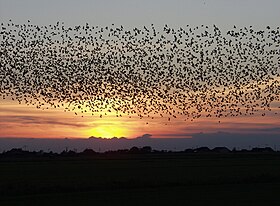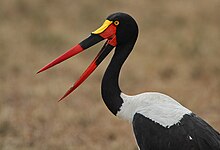List of Ciconiiformes by population
| The population of birds |
|---|
 |
This is a list of Ciconiiformes species by global population. While numbers are estimates, they have been made by the experts in their fields. For more information on how these estimates were ascertained, see Wikipedia's articles on population biology and population ecology.
This list is incomprehensive, as not all Ciconiiformes have had their numbers quantified. The classification of this order of birds is currently in flux; the classification for this list is aligned with the IUCN's current position, but may change in the future.
Species by global population
| Common name | Binomial name | Population | Status | Trend | Notes | Image |
|---|---|---|---|---|---|---|
| Storm's stork | Ciconia stormi | 400-500[1] | EN[1] | Equal to 260-330 mature individuals. Based on estimates of 150 individuals in Malaysia, and 250 in Indonesia.[1] | 
| |
| Saddlebill | Ephippiorhynchus senegalensis | 1,000-25,000[2] | LC[2] | Equal to 670-17,000 mature individuals.[2] | 
| |
| Greater adjutant | Leptoptilos dubius | 1,200-1,800[3] | EN[3] | Equal to 800-1,200 mature individuals. Estimate based on estimates of 650-800 birds in Assam, India, 150-200 in Cambodia, and 156 in Bihar state, India.[3] | 
| |
| Milky stork | Mycteria cinerea | 2,200[4] | EN[4] | Equal to 1,500 mature individuals.[4] | 
| |
| Oriental stork | Ciconia boyciana | 1,000-2,499[5] | EN[5] | Estimate for mature individuals.[5] | 
| |
| Lesser adjutant | Leptoptilos javanicus | 8,000-15,000[6] | VU[6] | Equal to 5,500-10,000 mature individuals.[6] | 
| |
| African woollyneck | Ciconia microscelis | 10,000-100,000[7] | LC[7] | |||
| Jabiru | Jabiru mycteria | 20,000-85,000[8] | LC[8] | Unknown[8] | Estimate for mature individuals. Another estimate has been made that places the population at fewer than 50,000 mature individuals.[8] | 
|
| Black-necked stork | Ephippiorhynchus asiaticus | 15,000-35,000[9] | NT[9] | Conservative range.[9] | 
| |
| Black stork | Ciconia nigra | 24,000-44,000[10] | LC[10] | Unknown[10] | European subpopulation estimated at 19,500-27,800 mature individuals.[10] | |
| Painted stork | Mycteria leucocephala | 25,000-35,000[11] | NT[11] | Equal to 16,000-24,000 mature individuals.[11] | 
| |
| Asian woollyneck | Ciconia episcopus | 50,000-249,999[12] | NT[12] | Precautionary estimate for mature individuals.[12] | ||
| African openbill | Anastomus lamelligerus | 300,000-500,000[13] | LC[13] | 
| ||
| White stork | Ciconia ciconia | 700,000-704,000[14] | LC[14] | European subpopulation estimated at 447,000-495,000 mature individuals.[14] |
See also
References
- ^ a b c d IUCN (2016-10-01). "Ciconia stormi: BirdLife International: The IUCN Red List of Threatened Species 2017: e.T22697685A110066434". IUCN Red List of Threatened Species. 2016-10-01. doi:10.2305/iucn.uk.2017-1.rlts.t22697685a110066434.en.
- ^ a b c d IUCN (2016-10-01). "Ephippiorhynchus senegalensis: BirdLife International: The IUCN Red List of Threatened Species 2016: e.T22697706A93631820". IUCN Red List of Threatened Species. 2016-10-01. doi:10.2305/iucn.uk.2016-3.rlts.t22697706a93631820.en.
- ^ a b c d IUCN (2016-10-01). "Leptoptilos dubius: BirdLife International: The IUCN Red List of Threatened Species 2016: e.T22697721A93633471". IUCN Red List of Threatened Species. 2016-10-01. doi:10.2305/iucn.uk.2016-3.rlts.t22697721a93633471.en.
- ^ a b c d IUCN (2016-10-01). "Mycteria cinerea: BirdLife International: The IUCN Red List of Threatened Species 2016: e.T22697651A93627701". IUCN Red List of Threatened Species. 2016-10-01. doi:10.2305/iucn.uk.2016-3.rlts.t22697651a93627701.en.
- ^ a b c d IUCN (2018-08-09). "Ciconia boyciana: BirdLife International: The IUCN Red List of Threatened Species 2018: e.T22697695A131942061". IUCN Red List of Threatened Species. 2018-08-09. doi:10.2305/iucn.uk.2018-2.rlts.t22697695a131942061.en.
- ^ a b c d IUCN (2016-10-01). "Leptoptilos javanicus: BirdLife International: The IUCN Red List of Threatened Species 2017: e.T22697713A110481858". IUCN Red List of Threatened Species. 2016-10-01. doi:10.2305/iucn.uk.2017-1.rlts.t22697713a110481858.en.
- ^ a b c IUCN (2016-10-01). "Ciconia microscelis: BirdLife International: The IUCN Red List of Threatened Species 2016: e.T22727265A94945236". IUCN Red List of Threatened Species. 2016-10-01. doi:10.2305/iucn.uk.2016-3.rlts.t22727265a94945236.en.
- ^ a b c d IUCN (2019-12-04). "Jabiru mycteria: BirdLife International: The IUCN Red List of Threatened Species 2021: e.T22697710A163624043". IUCN Red List of Threatened Species. 2019-12-04. doi:10.2305/iucn.uk.2021-3.rlts.t22697710a163624043.en.
- ^ a b c d IUCN (2016-10-01). "Ephippiorhynchus asiaticus: BirdLife International: The IUCN Red List of Threatened Species 2016: e.T22697702A93631316". IUCN Red List of Threatened Species. 2016-10-01. doi:10.2305/iucn.uk.2016-3.rlts.t22697702a93631316.en.
- ^ a b c d IUCN (2016-10-01). "Ciconia nigra: BirdLife International: The IUCN Red List of Threatened Species 2017: e.T22697669A111747857". IUCN Red List of Threatened Species. 2016-10-01. doi:10.2305/iucn.uk.2017-1.rlts.t22697669a111747857.en.
- ^ a b c d IUCN (2016-10-01). "Mycteria leucocephala: BirdLife International: The IUCN Red List of Threatened Species 2016: e.T22697658A93628598". IUCN Red List of Threatened Species. 2016-10-01. doi:10.2305/iucn.uk.2016-3.rlts.t22697658a93628598.en.
- ^ a b c d IUCN (2020-08-19). "Ciconia episcopus: BirdLife International: The IUCN Red List of Threatened Species 2020: e.T22727255A175530482". IUCN Red List of Threatened Species. 2020-08-19. doi:10.2305/iucn.uk.2020-3.rlts.t22727255a175530482.en.
- ^ a b c IUCN (2018-08-06). "Anastomus lamelligerus: BirdLife International: The IUCN Red List of Threatened Species 2018: e.T22697664A132274733". IUCN Red List of Threatened Species. 2018-08-06. doi:10.2305/iucn.uk.2018-2.rlts.t22697664a132274733.en.
- ^ a b c d IUCN (2016-10-01). "Ciconia ciconia: BirdLife International: The IUCN Red List of Threatened Species 2016: e.T22697691A86248677". IUCN Red List of Threatened Species. 2016-10-01. doi:10.2305/iucn.uk.2016-3.rlts.t22697691a86248677.en.

